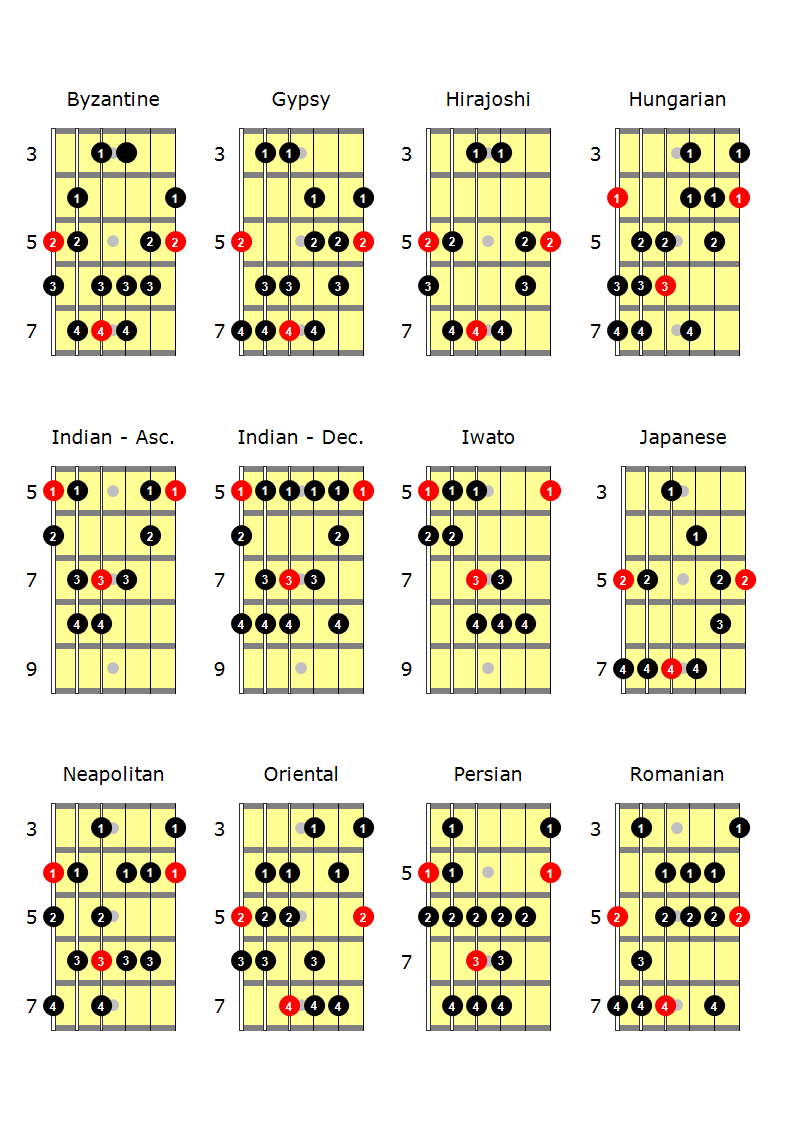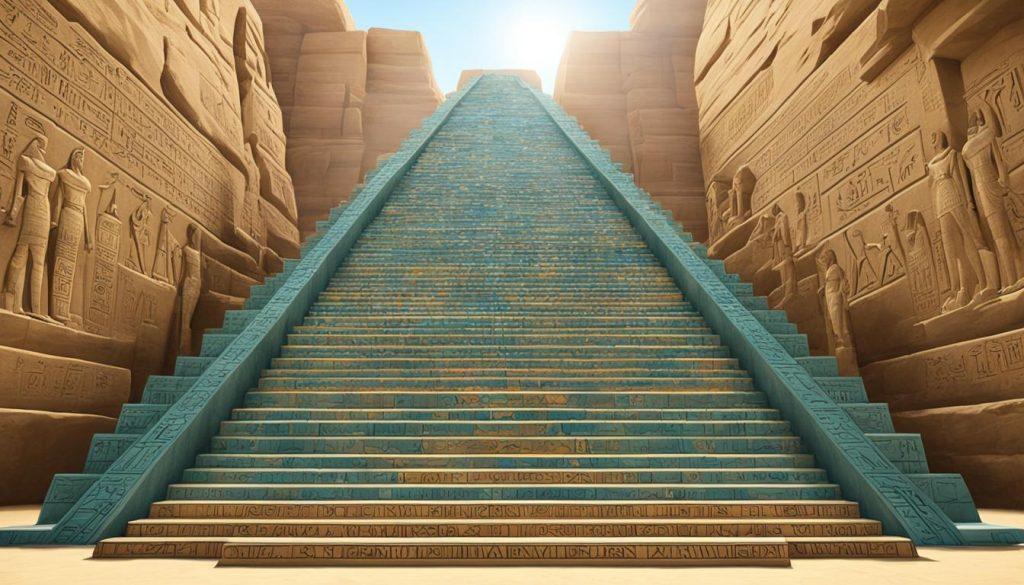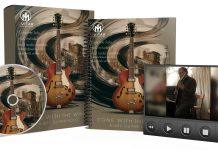This post may contain affiliate links. As an Amazon associate, Google associate as well as associate for other programs, Guitar & Music Institute may earn commissions from qualifying purchases.

Interested in learning more about exotic scales to employ in your guitar playing and ultimately your compositions and improvisations? You’ve come to the right place! Exploring exotic scales is a fantastic way to add new flavors and unique sounds to your guitar playing. In this article, we will delve into the world of exotic guitar scales and show you how they can take your musicality to the next level.
Key Takeaways:
- Exotic guitar scales can add new flavors and unique sounds to your playing.
- Learning these scales can open up new possibilities for composition and improvisation.
- Understanding fretboard patterns and scale formulas is crucial in mastering exotic scales.
- Playing with innovative techniques and incorporating world music scales can help you stand out musically.
- The scales we will explore originate from various cultures, such as Middle Eastern, Indian, Eastern European, and Japanese.
The Arabian Scale
Looking to add a Middle Eastern flavor to your guitar playing? The Arabian scale is the perfect choice. This exotic scale, also known as the octatonic minor scale or the diminished scale, has a distinct sound that will transport your music to another world.
The scale formula for the Arabian scale is 1, 2, b3, 4, #4, #5, 6, 7. By incorporating these unique intervals into your playing, you can create melodies and solos with an enchanting and mysterious vibe. Whether you’re exploring world music styles or simply looking to expand your musical horizons, the Arabian scale is a valuable addition to your repertoire.
How to Use the Arabian Scale
The Arabian scale is commonly used in Middle Eastern music and can also be found in various genres such as jazz and fusion. Its distinct intervals allow for expressive and emotional playing. You can experiment with different patterns and fingerings to find what suits your playing style.
To get started with the Arabian scale, try improvising over a simple backing track or jamming with other musicians. Explore different melodic ideas and experiment with bending notes to add your own personal touch.
Unlocking New Musical Possibilities
By incorporating the Arabian scale into your guitar playing, you’ll be able to infuse your music with the rich cultural flavors of the Middle East. Whether you’re working on composing your own music, improvising solos, or creating unique melodies, this scale will help you stand out and captivate your audience.
So, pick up your guitar and embark on a musical adventure with the Arabian scale. Let your creativity flow and explore the magical sounds of this exotic scale.

These scales are part of the book Scales You Can Use! by Ged Brockie. You can view the book for purchase by clicking HERE and purchase directly from the GMI website, or add to cart at the bottom of this page.
The Persian Scale
The Persian scale is a major scale with a unique twist, featuring a b2, b5, and b6. Its distinct sound makes it a popular choice in Middle Eastern and Indian music. This exotic guitar scale offers a rich and captivating tonal palette that can add depth and allure to your playing.
The scale formula for the Persian scale is 1, b2, 3, 4, b5, b6, 7. By incorporating these intervals into your melodies and improvisations, you can create a mesmerizing atmosphere and evoke the flavors of the Persian musical tradition.
To visualize the Persian scale on the guitar fretboard, refer to the chart below:
When exploring the Persian scale, take time to familiarize yourself with its unique intervals and patterns. Experiment with different phrasings and techniques to emphasize its exotic characteristics. By incorporating this scale into your playing, you’ll elevate your musicality and unlock new creative possibilities.
The Byzantine Scale
The Byzantine scale, also known as the Maqam Hijaz scale or the double harmonic scale, is a major scale with a b2 and b6. This unique combination of intervals gives the scale a mysterious and exotic sound that is often associated with the music of Eastern Europe and the Middle East.
When played on the guitar, the Byzantine scale opens up a world of possibilities for creating captivating melodies and adding a touch of Eastern flavor to your playing. The scale formula for the Byzantine scale is 1, b2, 3, 4, 5, b6, 7.
To master the Byzantine scale on the guitar, it’s important to practice the scale patterns and explore different fretboard positions. By familiarizing yourself with the scale’s unique intervals and incorporating them into your improvisation, you can create evocative and exotic musical phrases.
Experiment with bending notes, sliding between positions, and using different techniques such as vibrato to bring out the distinctive qualities of the Byzantine scale. Combine it with other scales and modes to create interesting harmonic and melodic textures.
Whether you’re a beginner guitarist looking to expand your musical horizons or an experienced player seeking new sounds to incorporate into your compositions, the Byzantine scale is a powerful tool to add to your repertoire of exotic guitar scales. Unlock the captivating sounds of the Byzantine scale and let your creativity soar.
The Egyptian Scale
The Egyptian scale is an exotic guitar scale that adds a touch of Middle Eastern flavor to your playing. It is a pentatonic scale and the 5th mode of the minor pentatonic scale. The scale formula consists of the notes 1, 2, 4, 5, and b7. This unique combination of tones creates a distinct and haunting sound.
When you incorporate the Egyptian scale into your guitar solos or improvisation, you can evoke an exotic atmosphere and captivate your audience with its rich and mysterious character. The scale’s Dorian mode quality gives it a melodic and modal feel, allowing you to explore various musical possibilities.
To learn the Egyptian scale, you can start by practicing it in different positions on the guitar fretboard. Experiment with different phrasing techniques and note combinations to unlock its true potential. Incorporating bends, slides, and vibrato can further enhance the expressive nature of this scale.

The Oriental Scale
The Oriental scale is a dominant scale with a b2 and b5, making it an exotic addition to your repertoire of guitar scales. This scale is frequently utilized in Middle Eastern and Asian music genres, infusing your playing with a unique and captivating sound. The scale formula for the Oriental scale is 1, b2, 3, 4, b5, 6, b7.
By incorporating the Oriental scale into your improvisations, you can create a vibrant and distinctive musical atmosphere. The b2 and b5 intervals add tension and intrigue to your guitar solos, allowing you to explore new tonalities and melodic possibilities.
To gain mastery over the Oriental scale, practice its fretboard patterns and experiment with different rhythmic patterns and note combinations. By doing so, you’ll develop a strong command of this scale and enhance your overall musicality.
Exploring exotic guitar scales like the Oriental scale can greatly expand your musical palette, enabling you to create captivating melodies and solos. Incorporate this scale into your practice routine and let its unique characteristics inspire your musical creativity.
The Japanese Scales
Japanese scales offer a unique and exotic sound to your guitar playing. In this section, we will explore two popular Japanese scales: the Japanese scale and the Hirajoshi scale.
The Japanese Scale
The Japanese scale is a pentatonic scale that is widely used in traditional and contemporary Japanese music. It is known for its distinct sound as it excludes the 3rd note.
The scale formula for the Japanese scale is: 1, 2, 4, 5, b6.
This scale is particularly popular in rock music due to its simplicity and versatility. Many iconic rock guitar riffs and solos have been created using the Japanese scale.
The Hirajoshi Scale
The Hirajoshi scale is a minor pentatonic scale commonly used in rock and jazz music. It has a dark and mysterious quality that adds depth to your guitar playing.
The scale formula for the Hirajoshi scale is: 1, 2, b3, 5, b6.
When used in rock music, the Hirajoshi scale creates a unique and exotic atmosphere, allowing you to explore different tonalities and express yourself creatively.
By incorporating these Japanese scales into your guitar playing, you can infuse your music with a touch of exoticism and captivate your audience. Experiment with these scales and unleash your creativity to create captivating melodies and solos.
The Asavari Scale (Indian Raga)
The Asavari scale, also known as raga Asavari, is a scale used in Indian classical music. It is a rich and complex scale that goes beyond traditional Western scales. The Asavari scale has a distinct melodic movement and specific tonal characteristics that give it an unmistakable Indian raga flavor.
This scale is a fundamental part of Indian music and plays a significant role in creating the unique sounds and emotions associated with this ancient musical tradition. It is known for its ability to evoke a sense of longing, contemplation, and devotion.
The Asavari scale is traditionally played differently ascending and descending, which adds to its distinctiveness. The ascending pattern typically follows the scale formula 1, b2, 4, 5, b6, 7, while the descending pattern often incorporates additional notes.
Within the realm of Indian classical music, the Asavari scale serves as the foundation for various ragas, each with their own characteristic melodies and ornamentations. These ragas bring out different moods and evoke different emotions, providing infinite possibilities for expression and improvisation.
Key Characteristics of the Asavari Scale:
- Rich and complex scale used in Indian classical music
- Distinct melodic movement and tonal characteristics
- Traditionally played differently ascending and descending
- Forms the foundation for various ragas in Indian music
- Elicits a wide range of emotions and expressions
Exploring the Asavari scale and integrating it into your guitar playing can bring a beautiful and exotic element to your music. By learning the unique melodic patterns and intricacies of this scale, you can tap into the rich heritage of Indian music and infuse your playing with its incredible depth and soulfulness.
The Hungarian Gypsy Minor Scale
The Hungarian Gypsy Minor scale is a captivating and evocative scale that adds a touch of mystery to your guitar playing. Originating from Eastern European and Gypsy music, this exotic guitar scale is known for its unique sound and distinct character.
The scale formula for the Hungarian Gypsy Minor scale is 1, 2, b3, #4, 5, b6, 7. The addition of the #4 interval gives this scale its signature dark and enigmatic quality. When played, it creates a haunting atmosphere that instantly grabs the listener’s attention.
Incorporating the Hungarian Gypsy Minor scale into your musical repertoire allows you to explore new sonic territories and infuse your playing with a sense of cultural richness. Whether you’re looking to create emotive melodies or delve into the expressive world of improvisation, this scale offers a plethora of possibilities.
Benefits of Learning the Hungarian Gypsy Minor Scale
- Expand your musical vocabulary with an exotic and unconventional scale.
- Add depth and emotional intensity to your compositions and solos.
- Explore Eastern European and Gypsy musical traditions.
- Enhance your improvisation skills with unique melodic phrases.
By incorporating the Hungarian Gypsy Minor scale into your guitar-playing toolkit, you can unlock a world of musical expression and captivate your audience with its enchanting tones.
Take your guitar playing to new heights by experimenting with the Hungarian Gypsy Minor scale and embracing the allure of its dark and mesmerizing sound. Let this scale transport you to the rich and vibrant musical traditions of Eastern Europe and immerse yourself in its captivating melodies.

Continue to the next section to explore another fascinating exotic guitar scale.
The Romanian Scale
The Romanian scale, also known as the Ukrainian Dorian scale or the altered Dorian scale, is an exotic guitar scale that belongs to the minor scale family. It is characterized by its unique and captivating sound. The highlight of this scale is the #4, which adds a distinctive flavor to your guitar playing.
The Romanian scale follows a specific formula: 1, 2, b3, #4, 5, 6, b7. This scale is derived from the harmonic minor scale and serves as its fourth mode. By incorporating the Romanian scale into your playing, you can explore new melodic possibilities and create an enchanting atmosphere in your music.
If you want to master the art of playing exotic guitar scales, the Romanian scale is a must-know. Its distinct tonal characteristics and rich melodic potential make it an essential tool for adding intrigue and depth to your compositions and improvisations.
Benefits of the Romanian Scale:
- Unlock a unique and captivating sound
- Add exotic flavors to your guitar playing
- Expand your melodic vocabulary
- Create enchanting atmospheres in your music
- Enhance your improvisation skills
Take your guitar playing to new heights with the Romanian scale. Incorporate it into your practice routine, experiment with different musical contexts, and let its exotic allure inspire your musical creativity.
Conclusion
Congratulations on exploring these 11 exotic scales for guitar! By incorporating these unique scales derived from different musical traditions around the world, you have the opportunity to master new sounds and flavors in your guitar playing.
These exotic scales have the power to make your music stand out and captivate listeners with their distinct character. Whether you’re drawn to the Middle Eastern vibes of the Arabian and Persian scales, the mysterious allure of the Byzantine scale, or the pentatonic magic of the Egyptian and Japanese scales, there’s something for every musical taste.
As you continue to practice and experiment with these scales, you’ll unlock a world of possibilities for expressing your musicality. By incorporating these innovative techniques into your guitar playing, you can elevate your skills and develop your own unique voice as a musician.
Remember, mastering the guitar is a journey, and these exotic scales are just one piece of the puzzle. Stay dedicated, keep exploring, and let your passion for music guide you as you strive to create truly exceptional and unforgettable compositions. With these exotic scales, you have the power to transform your guitar playing into a mesmerizing and one-of-a-kind musical experience.
Source Links
- https://www.guitarcommand.com/exotic-guitar-scales/
- https://www.jazzguitar.be/blog/exotic-guitar-scales/
- https://www.jazz-guitar-licks.com/blog/exotic-scales-guitar.html
This post may contain affiliate links. As an Amazon associate, Google associate as well as associate for other programs, Guitar & Music Institute may earn commissions from qualifying purchases.


























